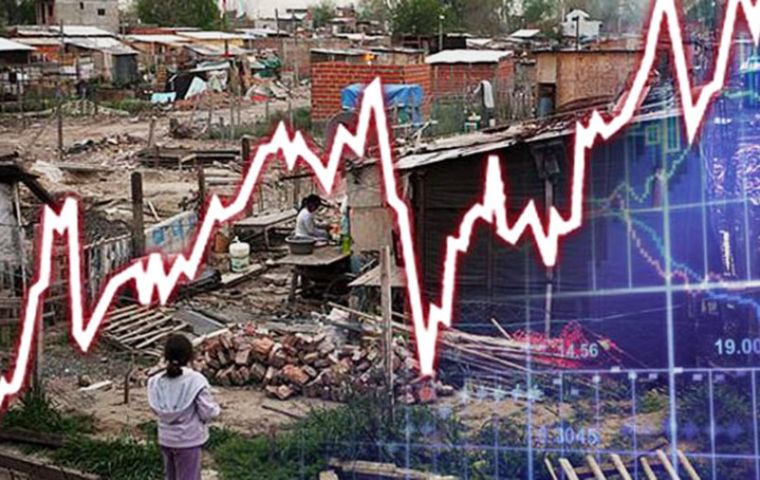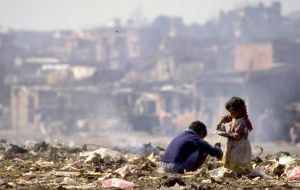MercoPress. South Atlantic News Agency
A third of the Argentine population is considered poor
 The survey from the Catholic University of Argentina's Social Debt Observatory, found that 33.6% of Argentines were below the poverty line in the third quarter
The survey from the Catholic University of Argentina's Social Debt Observatory, found that 33.6% of Argentines were below the poverty line in the third quarter  That equates to 13.6 million people, an increase of almost 2.2 million individuals in relation to a year ago, according to UCA's data
That equates to 13.6 million people, an increase of almost 2.2 million individuals in relation to a year ago, according to UCA's data  The Social Debt Observatory, headed by Agustín Salvia, gained prestige for its skill in measuring poverty when INDEC stopped offering reliable statistics
The Social Debt Observatory, headed by Agustín Salvia, gained prestige for its skill in measuring poverty when INDEC stopped offering reliable statistics Poverty in Argentina has risen to its highest in eight years, a new report has revealed, with more than a third of the population now considered to be poor. The new survey, from the Catholic University of Argentina's Social Debt Observatory, found that 33.6% of Argentines were living below the poverty line in the third quarter of the year.
That equates to 13.6 million people, an increase of almost 2.2 million individuals in relation to a year ago, according to UCA's data, when just over 28% of Argentines were considered to be living in poverty. Of the latest figures, 2.47 million were considered to be living in extreme poverty – a rise of 161,500 people from the same period last year.
“In the third quarter of 2018, 25.6% of households and 33.6% of people fell below the poverty line,” the report says, highlighting that Argentina was facing its highest levels seen since at least 2010.
The Social Debt Observatory, headed by Agustín Salvia, gained prestige for its skill in measuring poverty cover the past decade, when the INDEC national statistics bureau stopped offering reliable statistics during the Kirchnerite administrations.
“The incidence of poverty in this period [third quarter of 2018] reaches levels higher than those recorded in 2016, when significant devaluations caused a rise in inflation and a fall in purchasing power,” the study's authors noted, explaining that over the last year “the Argentine economy went from a cycle of growth to a strong recession,” highlighting the impact of recent economic turmoil and the devaluation of the peso earlier this year.
“The new scenario has had an effect on the real income available to household, [leading to] a deterioration of the purchasing power of salaries, retirement pensions and social welfare programs,” the study concluded, adding that the current macroeconomic climate had proven “unfavorable” for the labor market and the creation of jobs.
The new report casts a long shadow over the Mauricio Macri administration's attempts to tackle poverty. Just last week, a new study by UNICEF, created in conjunction with several local universities, has revealed that 48% of Argentina’s children and adolescents under 18 were poor. Using a new multidimensional method to measure poverty levels, the UN organization said that of the 6.3 million children considered to be living in poverty, a further 20% were living in extreme poverty.




Top Comments
Disclaimer & comment rules-

-

-

Read all commentsWe are all aware that the bad weather, which has severely reduced the harvest, is a result of Macri's policy.
Dec 15th, 2018 - 09:53 pm +1We also know that the very trustworthy Kirchnerista version of INDEC, which year after year assured us of an inflación of less than ten per cent, reported a poverty level below those of Germany and Scandinavia.
A third of the Argentine population is considered poor?
Dec 18th, 2018 - 02:29 pm 0If it is IMPOSSIBLE to reduce poverty; it's much easier to reduce the number of the poor to the 10th or lesser.
“The Villas were created by the Kthugs.”
Dec 18th, 2018 - 06:05 pm 0Cold War-era vestige imoyaro believes MP readers are a bunch of ignorant people -- instead, it is his own ignorance that surfaces.
Villas miseria in Buenos Aires, as favelas in Rio de Janeiro and callampas in Santiago de Chile existed long before the term Kirchnerism became known in Argentina.
Best luck next time, dino.
Commenting for this story is now closed.
If you have a Facebook account, become a fan and comment on our Facebook Page!